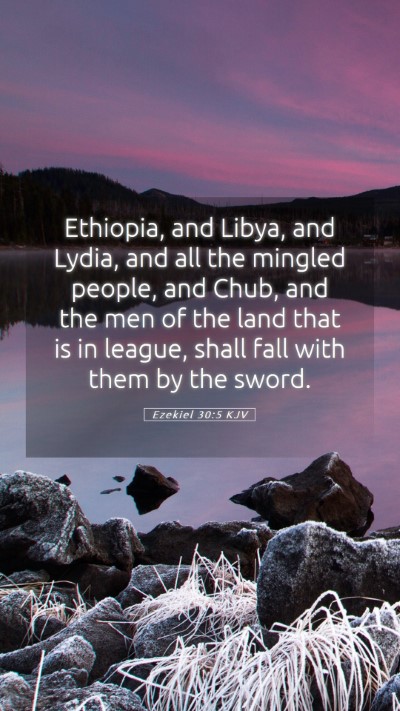Bible Verse Meaning and Commentary for Ezekiel 30:5
Ezekiel 30:5 states, "The Cushites and the Libyans, the Nubians and all the allied people will fall by the sword." This verse is a part of a larger prophecy concerning the judgment and destruction of various nations. Below is a comprehensive summary drawn from respected public domain commentaries, providing insights into its significance and meaning.
Context and Background
The Book of Ezekiel is a prophetic text authored by the prophet Ezekiel during the Babylonian exile of the Israelites. This particular chapter focuses on the fate of Egypt and its allies in the context of God's divine judgment. The nations mentioned in Ezekiel 30:5 are tied to historical alliances and conflicts during the ancient Near Eastern period, highlighting God's power over nations and His overarching plan for Israel.
Analysis from Public Domain Commentaries
Utilizing insights from Matthew Henry, Albert Barnes, and Adam Clarke, we can derive a deeper understanding:
-
Matthew Henry's Commentary:
Henry emphasizes the certainty of God's judgment. He explains that the Cushites (from modern-day Sudan) and Libyans were significant nations in the context of Egyptian history and military alliances. The verse serves as a prophetic warning of their impending doom, illustrating that Egypt’s reliance on these allies would ultimately lead to their downfall as they could not escape God's judgment.
-
Albert Barnes' Notes:
Barnes provides additional historical context, noting that the nations mentioned played pivotal roles in regional power dynamics. He interprets the verse as a clear indication that God will cut off these nations, portraying the clash of nations as being under divine control. This underscore’s God's sovereignty over even the great powers that opposed Him.
-
Adam Clarke's Commentary:
Clarke delves into the symbolic meanings of these nations. He relates their judgment to broader prophetic themes of exile and restoration for Israel. The fall of these allied nations is representative of divine retribution against idolatry and oppression, highlighting God’s justice in punishing those who turn against Him.
Theological Significance
This verse encapsulates key themes within Biblical theology, including divine sovereignty, justice, and the consequences of turning away from God. It serves as a reminder of the powerful role that God plays in history and in the lives of nations. The judgment proclaimed through Ezekiel emphasizes that regardless of earthly alliances or power, no one can evade God's will.
Practical Applications
Understanding Ezekiel 30:5 can inform our daily lives in profound ways:
- Reflection on Human Alliances: It encourages believers to consider where they place their trust and reliance—ultimately, God is the only consistent and dependable ally.
- Promotion of Justice: The verse calls for a stand against oppression and injustice, echoing the larger theme of God’s care for the marginalized among His creation.
- Urgency in Spiritual Vigilance: Believers are reminded to remain vigilantly aware of the spiritual state of their lives and the world around them, preparing against the influences that lead away from God's truth.
Cross References
This verse connects to other significant Biblical passages, enriching our understanding:
- Isaiah 18:1-2: A prophetic declaration regarding Cush and its message to nations.
- Jeremiah 46:1-12: Prophecies concerning Egypt and its eventual downfall.
- Ezekiel 31:3-9: Further elaboration on the fall of Egypt and its glory compared to other nations.
Conclusion
Ezekiel 30:5 serves as a powerful reminder of the consequences of sin and disobedience, and God's ultimate authority over everything. It is a call to understand and embrace God's righteous nature while warning against misplaced trust in earthly powers. Through study and reflection on this verse, believers can gain deeper scriptural insights and applications for living according to God's will.


